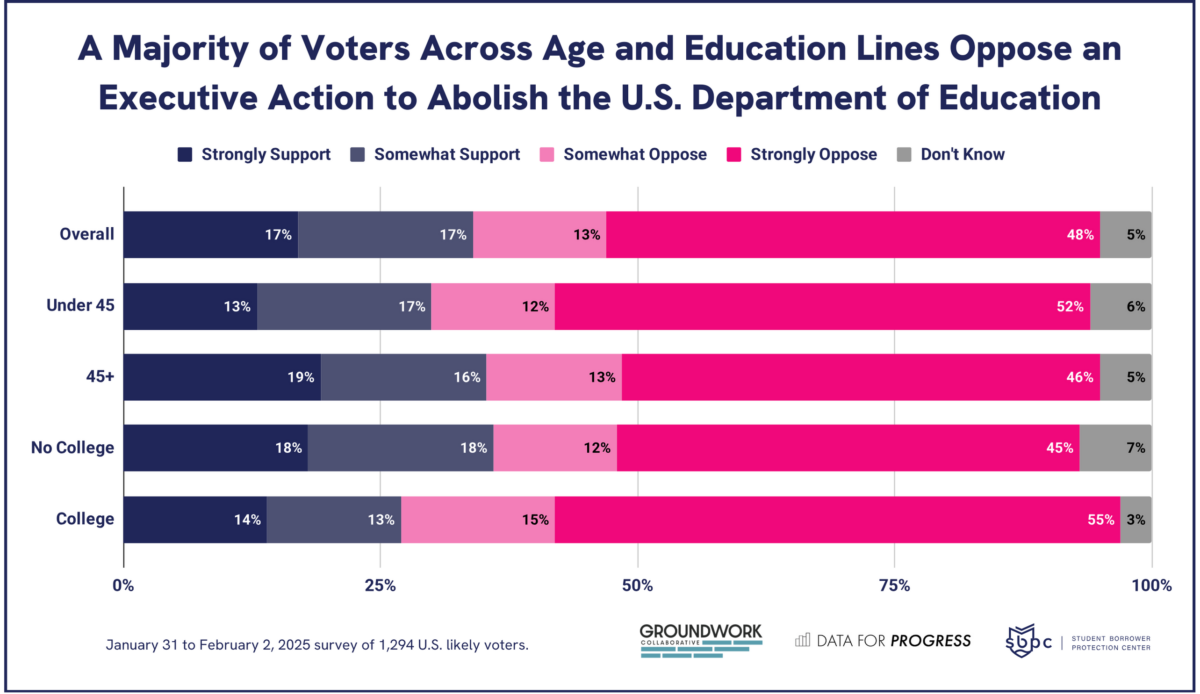Amidst ongoing debates regarding the future of American education, the Trump administration’s recent budget proposal and the signing of an executive order to dissolve the Department of Education (ED) have sparked widespread concern, as they significantly decrease funding streams for public schools, college access programs, and students with disabilities. Released on May 2, the Trump administration’s exemplar for the 2025-2026 federal budget proposed drastic cuts that would strip billions from federal education aid, dismantle civil rights protections, and transfer funds into block grants that would strip assets from underprivileged students. While supporters agree that authority should be returned to the states to ensure families have more say in their children’s education, critics argue that these actions threaten equity and opportunity in education, diverting necessary funds from students.

Major Funding Cuts and Program Eliminations
The Trump administration is aiming to dismantle the Department of Education, stripping essential programs that millions of Americans rely on. The Department of Education’s main role is to distribute federal funds to colleges, schools, and students– managing federal student loan portfolios and providing federal student aid. They are necessary in fostering educational excellence and ensuring equal access to educational opportunities. A recent budget proposal revealed that the Trump administration proposed to begin its overhaul of the Department of Education by slashing its funding by 15 percent, or $12 billion, halting activities, and reducing staff. As a result, roughly 1,300 staff were fired, hollowing out the agency. However, eliminating the department as a whole is extremely difficult. It requires support from Congress, but President Trump has indeed signed an executive order to do so, which does not require congressional approval. As we advance, dissolving the Department of Education will still pose obstacles, including facing public scrutiny, questioning of legality, and potential lawsuits. Furthermore, the Trump administration is questioning the authority of federal judges who are demanding pauses in the administration´s ED plans, creating legal and policy uncertainty.
Additionally, the budget proposal mentioned a $4.5 billion cut from K-12 programs. Among these cuts are all $890 million for English Language Acquisition for limited english proficient students, $70 million for the Teacher Quality Partnerships grant to diversify the teacher workforce, $7 million for Equity Assistance Centers that aid desegregation efforts, and a $49 million reduction in funds (35% of its total budget) for the Office for Civil Rights (OCR). Evidently, these significant cuts impact programs that aim to establish greater equity in education. Correspondingly, National Association President, Becky Pringle, expresses her concerns with the budget cuts, “For too long, parents, educators, and students have pleaded with elected leaders to live up to their promise to every student and provide the resources to give them every opportunity to thrive. And for too long, our leaders have failed us, and this is yet another example,” she continues, Rather than investing in opportunity and equity, this proposal advances a harmful agenda that slashes essential programs millions of Americans rely on every day.” Additionally, the administration is proposing to eliminate TRIO and GEAR UP, two well-established programs aimed at enhancing access to college for low-income students. More thoroughly capturing these programs’ importance, GEAR UP “serves approximately 570,000 students across almost 3,000 secondary schools, in which more than half of the students receive free or reduced-price lunch”, according to the Center for American Progress.
Although we are losing significant funds in many crucial programs, the administration has decided to preserve Title I, which provides funding to support students in low-income areas, and the Individuals with Disabilities Education Act (IDEA), which guarantees educational services for those with disabilities. However, the Trump Administration plans to regroup these specific, separate programs, potentially turning them into block grants that give the states more flexibility on how the money is spent. Many lawmakers from both parties are opposed to this redistribution because block grants typically result in less funding and less accountability. Consequently, many states are permitted to redirect these block grant funds to private school voucher programs, which the Trump Administration strongly supports. Overall, the Trump Administration and many of their supporters believe that the transfer of authority to the states when it comes to education is significant because it gives parents and communities more control over their children’s education, as mentioned in an email by Andrew Mahaleris, a spokesperson for Texas Gov. Abbott. However, the National Education Association points out that “without federal oversight, states would not have to answer to anyone about how the funds are used—and whether important rights, protections, and services for students are being safeguarded.” For instance, private schools are not required by law to provide disabled students certain protections or due process rights. There could be various issues resulting from this.
Additionally, among many of Trump’s cuts, he is increasing funding for charter schools, investing $500 million to create more charter schools nationwide. This funding increase adds to the Trump Administration’s school privatization agenda, along with the push for private school vouchers. Many charter schools have been involved in financial mismanagement and scandals. Private school vouchers divert money that would have been used to fund public schools and allocate it to private schools. Put, “The students who remain in public schools lose resources while voucher students lose rights”, says Jessica Levin, the litigation director at the Education Law Center.
In effect of higher education, the Trump administration has also called to eliminate DEI (Diversity, Equity, and Inclusion) programs in institutions’ admissions, financial aid, hiring, and other proceedings, or they may lose federal funding. The administration believes that these processes should solely be based on merit, however, the upholding of DEI programs ensures that every person who is deserving can attain the opportunities of higher education, higher-paying jobs, and the ability to improve one’s socioeconomic status. Andrea Abrams, executive director of the progressive advocacy group Defending American Values Coalition, told USA TODAY that Trump’s “…baseless attacks on DEI are attacks on the promise of America, the promise that everyone should be able to build the life of their dreams without barriers standing in their way.” Elaborating further on this statement, attacking DEI programs threatens the ability of underprivileged individuals to attain the American Dream and only benefits the privileged. For instance, a low-income, first-generation, minority student may not attain the same opportunities as their privileged peers, creating what looks like a less impressive resume. Many DEI opposers believe that these programs withdraw jobs from more meritable individuals; however, well-regulated DEI admissions processes persist in heavily considering merit. To put it simply, jobs are not freely given to those who are without experience or merit. DEI processes are fair in the bigger picture of society because they seek to level the playing field by addressing systemic inequalities. Additionally, UW Medicine Office of Healthcare Equity states that “Diversity, equity, and inclusion are not only important to an organization but beneficial as well. Diversity allows for new perspectives, equity creates a fair environment and can help to provide opportunities for individuals who need it, and inclusion helps employees feel a sense of belonging and understanding. While illegal DEI should be investigated, this scrutiny encourages many companies and institutions to eliminate their DEI programs altogether– for instance, Meta canceled its DEI programs altogether to align itself with the Trump Administration. 
Overall, the dismantling of the Department of Education through major fund cuts and program eliminations to transfer authority to the states poses various challenges, and even some that are unseen to the eye.
Potential Abuses of Control
The main goal of dismantling the Department of Education by reducing program funds is to ensure that families have more say in their kids’ education. However, as mentioned earlier, privatization of schools, as well as state handling of education, poses various threats to accountability, transparency, and management of funds, where it is uncertain whether the protections, rights, and services of students are protected or not. Is it worth risking a student’s rights, services, and protections for a parent to be able to have more control over what their student is learning? Today, we are seeing significant censorship in schools due to parental pressures. Books and curriculum materials are being banned or challenged by parents because the material conflicts with their values or is perceived as inappropriate. Many of these essentially “controversial” materials cover topics like sex, gender, identity, race, and political ideology. By limiting access to comprehensive education such as this, parents do a disservice to their children’s education by stripping away their ability to make informed decisions for themselves, think critically, and expose themselves to differing beliefs. A child does not become indoctrinated by access to comprehensive education; they become informed. They do not become “woke”; they simply become educated. I believe that by giving parents authority over what their children are learning, they prevent them from forming their own beliefs through an informed process. By dismantling the Department of Education to give more control to states and parents, I believe there is a greater work at play– one in which attacks education in order to establish conformity. To take away information and control education is the first step in removing one’s ability to make informed decisions and protect oneself from tyranny and propaganda. This transfer of authority is truly threatening to our democracy.









